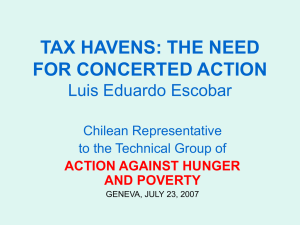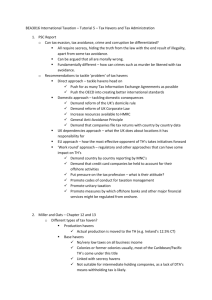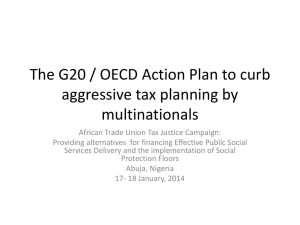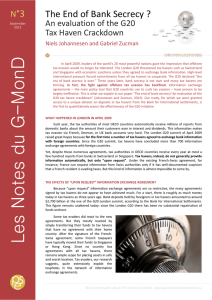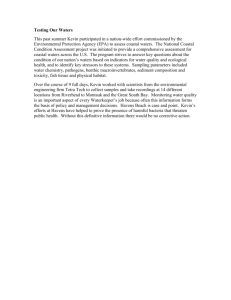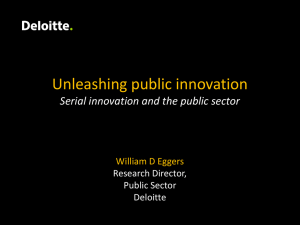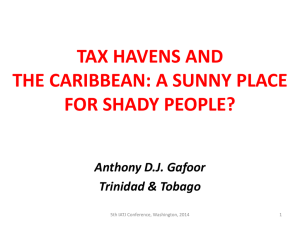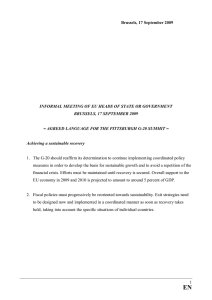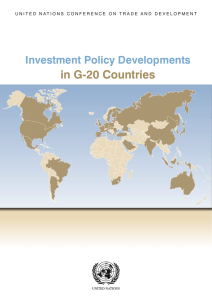Sorley McCaughey Christian Aid
advertisement
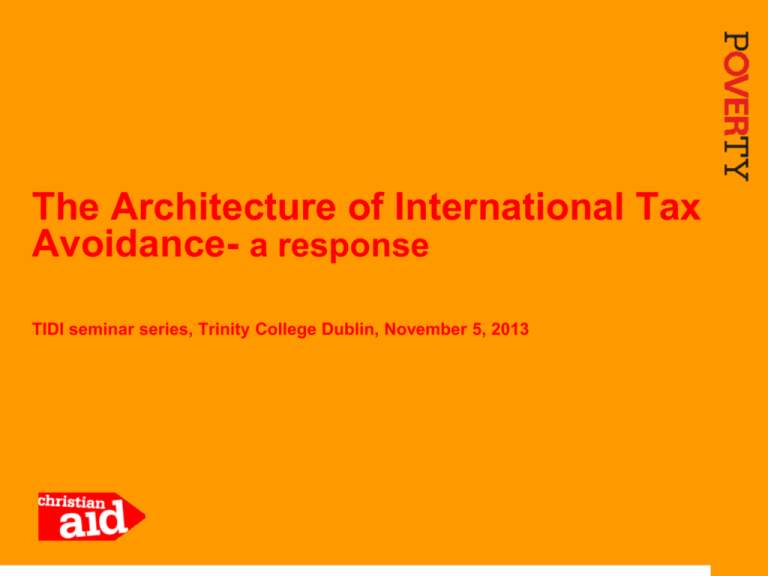
The Architecture of International Tax Avoidance- a response TIDI seminar series, Trinity College Dublin, November 5, 2013 1 Morality of tax? • • • • “It is not possible to construe a director’s duty to promote the success of the company as a constituting a positive duty to avoid tax”, Farrer and Co “Board-level executives often benefit from performance-related reward packages which are indirectly affected by the amount of tax the company pays. Corporate tax avoidance is presented as a matter of high-minded 'fiduciary' duty, but it is probably better understood as being about personal reward," David Quentin, barrister, and co-author of legal opinion. But even if you accept the relatively ‘traditional’ view of fiduciary duty, there is a strong business case for being progressive on tax. eg reputational risk to those perceived not to pay fair taxes (Amazon, Starbucks, and so on ) ‘Increasingly CFOs when deciding their tax practices are considering whether they would be embarrassed if the public knew about them” CFO, large MNC 2 Justin King, CEO Sainsbury's 3 Daily Telegraph, 5th November 2013 “How we do business, how we put back into the community of which we are a part, put back into the society from which we draw our revenues is a moral issue and it’s one that our consumers have every right to ask us.” “The vast majority of individuals in this country don’t get to elect where they pay their tax but some corporations do. I have a very simple view on it - a corporation should be prepared to stand up and say what tax it pays and why it chooses where to pay it - because if we’re doing nothing wrong, which is usually the thing I hear asserted, then we should have no problem at all laying it bare to public scrutiny” 4 Tax havens? • • • • • More than half of world trade – at least on paper – passes through tax havens (Shaxson 2011) More than half of all banking assets and a third of multinational company investments are routed via tax havens (Palan, Murphy and Chavagneux 2010), In 2010 the International Monetary Fund estimated that the money on the balance sheets of small island tax havens alone amounted to US$18tn – about a third of the world’s financial wealth(IMF Working paper 2010) 98 of the FTSE 100 have subsidiaries in tax havens (Action Aid, 2010) India, MNCs with presence in tax havens pay on average 30% less tax per unit of profit than those without presence in havens ( Christian Aid, Who Pays the Price ? 2013) 5 Ireland’s role 6 “We want to be a part of the solution, not the problem- Michael Noonan, October 2013 7 Are we part of the problem? • False Profits, 2008 - €5.8bn capital flow into Ireland arising from transfer mispricing, of which €268m came from the poorest 49 countries in the world (False Profits, Christian Aid 2008) • Action Aid report- Sweet Nothings, 2013- since 2007, Zambia has lost out on more than $9 million to a large multinational company, through in part, the use of a brass plate company in Dublin’s IFSC 8 Irish responsibility, or International issue? • “We will continue to ensure effective collaboration across Government in achieving our policy goals, including through joint programming across Departments in areas such as agri-food industry development, climate change mitigation, human resources for health, tax and development, and peace and security” - One World, One Future- Irish Aid Policy Paper, 2013 9 Spill-over Analysis? “As the report was prepared for a G-20 Working Group, the recommendations are, as would be expected, only addressed to G-20 member countries. The report, on page 27, considers that “it would be appropriate for G-20 countries to undertake a ‘spillover analysis’ of any proposed changes to their tax systems that may have a significant impact on the fiscal circumstances of developing countries”. Although the recommendation is only addressed to G-20 countries, in any event there have been no changes to the Irish tax system since the report was published, that would have adversely impacted on developing countries.” (Michael Noonan, Dail Eireann, response to PQ 11th June 2013) 10 OECD/BEPS process • • • • • Acknowledged that the current system was broken Tax law developed 80 years ago has not kept pace with changing business environment Integrity of CIT is at stage If other taxpayers, including ordinary citizens, think that MNCs can legally avoid paying their fair share of tax, it will undermine compliance by all taxpayers. Represents a threat to democracy itself (Angel Gurria, OECD Secretary General) 11 Our recommendations to the OECD on ways that this process could be improved were: 1.Take effective steps to ensure that developing countries can participate in the BEPS process on an equal footing, and assist them in implementing measures to stem their losses from international tax avoidance that deprives governments of badly needed revenues. Developing country involvement 2.Undertake – jointly with other organisations, policy makers from developing and developed countries, and independent experts – a rigorous study of the merits, risks and feasibility of more fundamental alternatives to the current international tax system, with special emphasis on the likely impact of these alternatives on developing countries 3.The G20 should urge the OEC D to follow its own recommendations regarding the duty to analyse the impact of potential tax policies on developing countries. 4.Governments in the G20 must promote a shift from tax competition to global and regional tax cooperation 12 Research possibilities • What are the alternatives to arms-length? • What would a spillover analysis look like in Ireland ? • Country by country Reporting – impact assessment? 13
